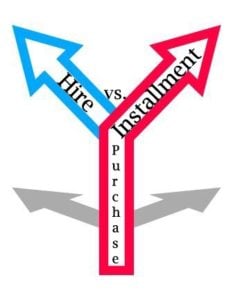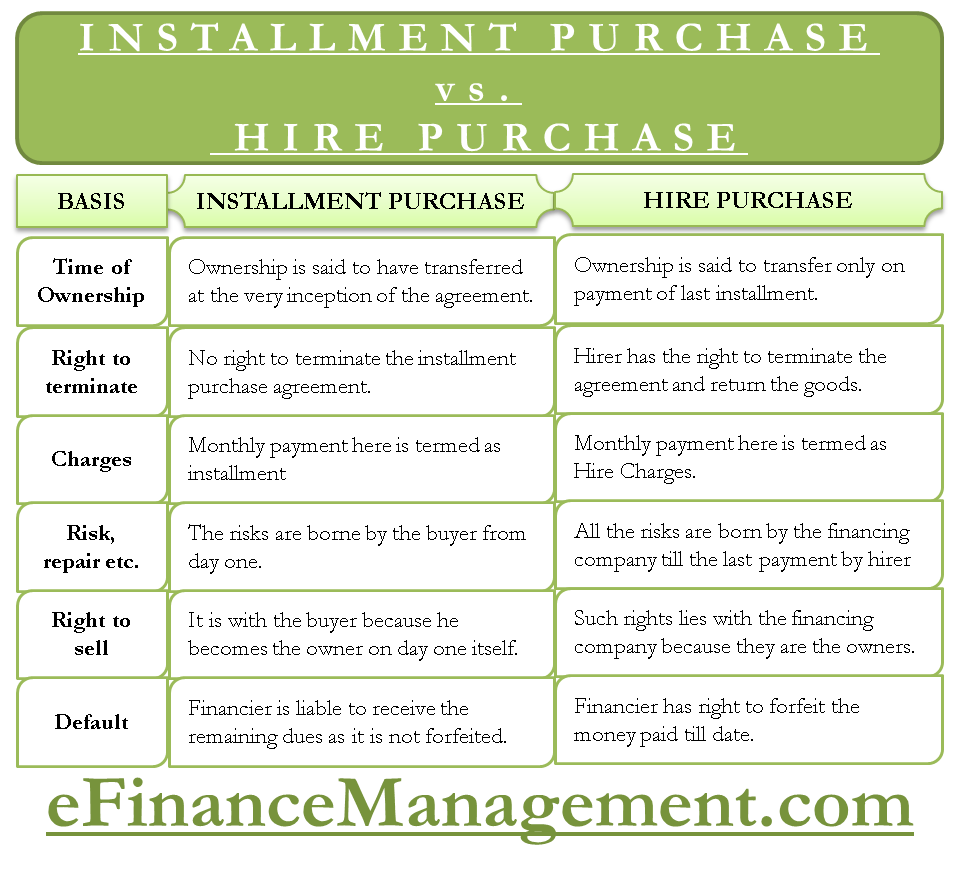Both hire purchase and installment sale are popular methods of financing goods. These methods are different in terms of their option to purchase, a right of termination, and transfer of ownership. Hire purchase is defined as an arrangement between the hirer (buyer or User) and seller of an asset whereby the seller allows the hirer to use the asset for a regular payment of installment for the purchase price. The buyer also has the option to purchase the goods on payment of all the installments. Whereas installment purchase is defined as another method of financing the capital goods/assets whereby the buyer purchases the goods, but the payment is made in smaller installments. Let us see more about the difference between the hire purchase vs installment purchase system.
Hire Purchase vs. Installment Purchase System
Both hire purchase and installment purchase may look similar as both are a method of finance, and payment in both cases is made in smaller parts. It is interesting to know the differences between the two in that impression. Following are the points of differences between the hire purchase vs installment purchase system.
Time of Purchase and Ownership

In the case of hire purchase, the act of purchasing takes place only when the whole payment is made to the financing company. It means after making payment of the last hire charges/installment only; the goods are considered purchased or if the buyer or hirer prepays in a lump sum in between the agreed period for purchasing the goods. In the case of an installment purchase, the purchase happens as soon as the agreement between the buyer and the financing company is entered into. In hire purchase, both ownership and purchase are delayed till the complete payment, whereas, in installment purchase, purchase and ownership take place before the complete payment.
Option / Right to Terminate
In the case of the hire purchase agreement, the hirer has an option/right to terminate the agreement and return the goods, whereas there is no such right or option available to the buyer in case of an installment purchase. This is because the purchase has not taken place in the case of hire purchase, but it takes place at the beginning only.
Also Read: Hire Purchase
Installment/Hire Charges
The monthly or period payment in installment purchase is termed an installment whereas, in hire purchase arrangement, it is called hire charges. Installment derives its value from the length of time, the sale value of an asset, and the interest rate. In contrast, the hire charges are a function of two additional factors, viz. option of termination and repairs and maintenance. Ideally, the installment should be less than the hire charges for the same asset. Therefore, hire purchase is an expensive system compared to installment purchase.

Risk, Repair, and Maintenance related to Asset
In hire purchase, all the risks are borne by the financing company until the hirer’s last payment because it is the official owner of the asset till that time. In installment purchases, the risks are borne by the buyer from day one. Similarly, repair and maintenance is the headache of the financier in the case of hire purchase and the buyer in case of an installment purchase.
Right to Sell or Transfer
The owner of the assets always exercises the right to sell or transfer. In the case of hire purchase, this right lies with the financing company or seller as the case may be because they are the owners of the asset. In the case of an installment purchase, it is with the buyer because he becomes the owner on the day he signs the agreement.
The default of Installment/Hire Charges
When a hirer defaults in the payment of hire charges, the financier has the right to forfeit the money paid till that date and take back possession of the goods. Whereas in installment purchase, the installment paid are not forfeited, and the financier is liable to receive the remaining dues.
Conclusion
In essence, the hire purchase system is suitable for the buyers who need the asset for a short period or are unsure of long-term needs. The cushion of returning the asset gives them this leverage. An installment system is helpful for those who are sure of utilizing the asset till its lifetime and those capable of taking responsibility for the asset in terms of its repairs and maintenance and its wear and tear.


Written simply and easly understandable…thank you
Hi there, always I used to check web site posts here in the early hours in the break of day because I enjoy learning more and more.